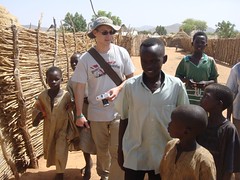When I was younger, and voicing my concerns about a situation, I would whine, “It’s not fair.” And my mother would simply state the truth, “life is not fair.” My complaints were trivial, but her answer could not have been more true.
 All the paths of a refugee camp end up looking the same. Especially in Camp Djabal where high straw fences line the camp and section off compounds. We cannot find Rahma’s house on our own instinct, and we soon give up and ask a group of boys huddled under a tree.
All the paths of a refugee camp end up looking the same. Especially in Camp Djabal where high straw fences line the camp and section off compounds. We cannot find Rahma’s house on our own instinct, and we soon give up and ask a group of boys huddled under a tree.
They repeat Rahma’s full name, and begin walking. We follow. Gabriel finds a photo of Rahma on his camera and we are assured we are heading in the right direction. We pass through many alley ways and by tents, and straw tukuls, drying clothes flapping in the wind, and women conversing with one another in the shade.
“Rahma!”
“Gabriel”
“Rahma”
“Khadija”
 I embrace him with friendship. Gabriel is smiling. Rahma is smiling. Eric and Ian are smiling. New friends and old reunited! The feeling seems mutual. Rahma talks with us for a moment and asks how are our families and the people in America. His English has approved so much.
I embrace him with friendship. Gabriel is smiling. Rahma is smiling. Eric and Ian are smiling. New friends and old reunited! The feeling seems mutual. Rahma talks with us for a moment and asks how are our families and the people in America. His English has approved so much.
Rahma is elated that we are here and we can see it dance in his eyes. But as Gabriel begins to ask about his life and family, sadness creeps in. A mixture of emotions. His eyes look down, and he points to the other side of the camp.
“My mother. She is sick. In the hospital.”
We begin to make our way towards the camp clinic. Rahma’s sister, Hawa, is near the entrance, and grandmother sits bedside. Hawa’s eyes are sad and her gaze serious. Their mother has been here for three days. Her aching body lies very still in bed.
“I am angry today,” Rahma shares with us. He doesn’t know what ails his mother.
 We seek a doctor and meet with a very gracious and open man. The exchange is translated from French to Arabic to English. I can see the temperature chart. It was high, then down a bit, peaked, and has been going down, but still not stable. He reads off two types of medicine, one of which is the general antibiotic amoxicillin used for infections. Rahma’s mother’s suffers from a pelvic infection. The other medication is for malaria.
We seek a doctor and meet with a very gracious and open man. The exchange is translated from French to Arabic to English. I can see the temperature chart. It was high, then down a bit, peaked, and has been going down, but still not stable. He reads off two types of medicine, one of which is the general antibiotic amoxicillin used for infections. Rahma’s mother’s suffers from a pelvic infection. The other medication is for malaria.
I am angry and very, very sad. Will the medicine work? How can her body, which most likely has a low immune system from dietary options, fight both at one time? I know these doctors, with so many patients and such few resources, are true heroes. But my heart reaches out to Rahma and his family. I wish she were some place else with more medical options.
It will be a short time before they know if the medications are working. If life appears to be coming back, she will go home in three days and continue the medication there. If she simply does not regain strength, then she will be transferred to the hospital in Goz Beida.
 After many more hours in the camp and testing live video feed for both tomorrow’s event with Angelina Jolie and Secretary of State Clinton and Saturdays 4 1/2 hour live show, we return to our small compound for an hour to shower before heading to the UNHCR office to work, and sleep as we can. As the others shower, I sit, drink water and begin to cry as I think about Rahma and his mother.
After many more hours in the camp and testing live video feed for both tomorrow’s event with Angelina Jolie and Secretary of State Clinton and Saturdays 4 1/2 hour live show, we return to our small compound for an hour to shower before heading to the UNHCR office to work, and sleep as we can. As the others shower, I sit, drink water and begin to cry as I think about Rahma and his mother.
I think of my own mother and the medical care she and I have access to. She is my only mother, and for so long, it was only her and I. I cannot imagine what it would feel like to be Rahma, or his sister, or grandmother. I cannot imagine my mother falling ill with such things that are easily cured and prevented, but could be life threatening here. All I can do is sit in the dark, watch the approaching lightning storm, wait for the rain, and cry.
Life is just not fair.


One reply on “Childhood Truth”
Thank you for all you are doing. That’s really all I can think of to write. Thank you for letting the people of Darfur know that they are not forgotten and helping them, I wish I could do the same